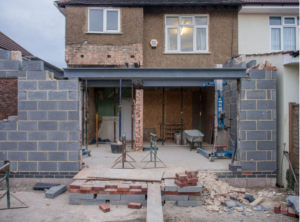An extension is one of the most expensive home improvements you can undertake. However, there are ways in which you can reduce the cost to make it more affordable. If you’ve got dreams of extending your home, but you’re on a tight budget, consider some of these cost-cutting tips.
Always get planning permission
There are cases in which you can extend your home without pursuing planning permission. However, it’s usually safest to seek out planning permission anyway, as in most cases you do need it. Failure to seek out planning permission could result in a planning breach, which could carry serious consequences such as heavy fines or an order to undo all the work.
Planning permission usually last for three years, which means that from the time of approval you’ll have plenty of time to utilise your permission and begin construction. By making sure that your home extension is legal, you can prevent any huge costs in the long run.
Avoid moving interior walls
While an extension can be an opportunity to reconfigure a home, you should be wary of moving interior walls. Moving an interior wall – particularly a load-bearing wall – can cost thousands. This is due to the fact that piping and electrics also have to be relocated. It’s much better to keep interior walls where they are.
Choose the right contractor
You should collect quotes from several contractors. This will allow you to compare prices and request price matches. While finding an affordable contractor is important, you should also consider their credibility. If you get a bad vibe from a cheap contractor, it may be better to not use them – a botched extension could be expensive to repair. Check out online reviews, get recommendations from other homeowners and make sure that any contractors you talk to have insurance and relevant licenses.
Shop around for materials yourself
You can ask contractors to sort out materials for you, however you may be able to save money by shopping for them yourself. Contractors will usually try to make a profit on any materials they order in. When you order the materials yourself, you don’t have to worry about this markup fee. Spend time looking into different timber merchants and brick merchants to collect different quotes. There are instances where you may be able to reduce the cost by negotiating. Make sure that you know the exact quantity needed and the exact type of material (an architect will be able to help you with this when designing the extension).
Find the right method of funding
The best way to fund a home extension is by saving up. However, for most people on a modest income, this can take years. A loan is often necessary to cover the costs – you have a few different options to consider such as extending your mortgage, re-mortgaging or taking out a home improvement loan to cover the costs. It’s worth comparing all these different options to work out which will be cheapest in the long run. Having a good credit score will give you more options when looking for a loan – interest will usually be higher if your credit score isn’t so good.
Note: This is a collaborative


No Comments